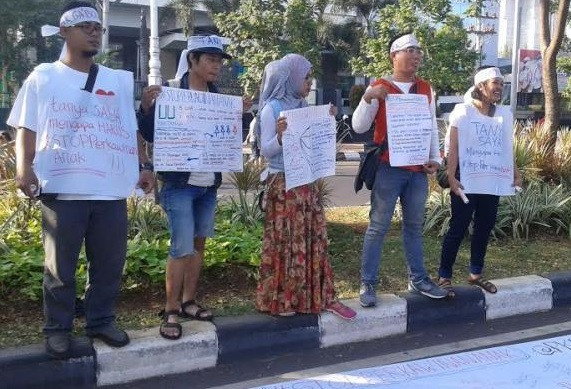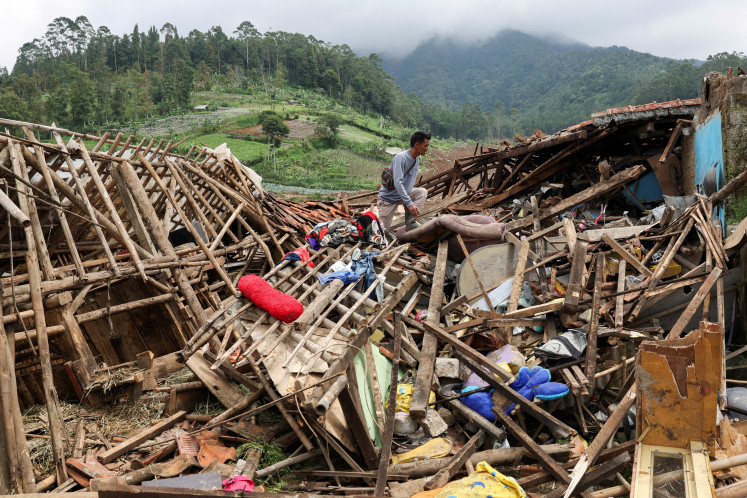Popular Reads
Top Results
Can't find what you're looking for?
View all search resultsPopular Reads
Top Results
Can't find what you're looking for?
View all search resultsKartini, child marriage and COVID-19 challenges
It is noteworthy that even before the COVID-19 pandemic, child marriage in certain areas in Indonesia was quite common.
Change text size
Gift Premium Articles
to Anyone
I
ndonesians celebrated Kartini Day on Wednesday to remember the key role of Raden Ajeng Kartini of Jepara in Central Java, as a pioneer of the enlightenment movement in the archipelago during colonial times. Indeed, Kartini was among the first in the Dutch East Indies to promote the importance of accessing modern sciences and pursue progress, including among females.
Her letters to JH Abendanon, who was in charge of implementing the ethical policy in the Dutch East Indies in the early 20th century, were later published in a Dutch magazine as From Darkness into Light, Women's Life in the Village and Letter of a Javanese Princess. These are inspiring manuscripts not just to girls and women but also to men and to those who are interested in modernity and progress.
Additionally, Kartini was a strong advocate for modern education for girls and along with her sisters established several schools for them. She was brilliant but her personal life was tragic. Though she managed to escape child marriage, thanks to the support of her enlightened father and elder brother, she could not avoid a polygamous marriage and sadly died just a few days after giving birth to her child on Sept. 17, 1904. Kartini died young at the age of only 25.
Child marriage was clearly common during Kartini's time and ironically remains rampant in the 21st century Indonesia. The COVID-19 pandemic has clearly worsened the prevalence of this harmful practice. There is an increasing number of reports that remind us of the severe economic and social impacts of COVID-19, including worsening poverty and school dropout rates that directly or indirectly push many families to catastrophic circumstances, including child marriage.
It is noteworthy that even before the COVID-19 pandemic, child marriage in certain areas in Indonesia was quite common. According to the 2018 Socio-Economic National Survey (SUSENAS), one in every nine girls aged 20-24 got married before the age of 18, affecting around 1.2 million young girls. As a matter of fact, Indonesia has the eighth-highest number of child marriages in the world. Several provinces in the country such as West and East Nusa Tenggara, as well as Aceh and West Sulawesi are regions with high rates of child marriage.
In special conditions such as natural disasters, humanitarian crises or big shocks such as an epidemic or pandemic, the incidence of child marriage could triple. The reasons, among many other things, are that parents wish to release their economic burdens or due to safety considerations and fear of unintended pregnancy.
Moreover, online learning during the COVID-19 pandemic has also unintentionally pushed many students to drop out due to lack of financial and technological means to continue their education.
Many parents have endured economic hardships, including losing their job or seeing a sharp reduction of income and can no longer support their children’s schooling during the pandemic, pushing them to let their children leave school and marry at an early age.
Studies have shown how child marriage and pregnancy at an early age have various harmful psychological, health and socioeconomic consequences. Child marriage is an important factor contributing to Indonesia's high maternal and child mortality rates, high prevalence of stunting in children, domestic violence and other impacts such as school dropout and divorce rates.
The government announced its commitment to reducing the child marriage rate from 11.21 percent in 2018 to at least 8.7 percent by 2024, with integrated efforts involving all related states agencies with the support of international organizations and foreign governments. The long-term goal is to meet the Sustainable Development Goals (SDGs) of decreasing the rate to 6.94 percent by 2030. A reduction in rates of child marriage has also been stated as the target of the National Medium-Term Development Plan (2020-2024).
Furthermore, the National Development Planning Agency (Bappenas) and the Women’s Empowerment and Child Protection Ministry launched a national strategy on child marriage prevention in February in collaboration with the United Nations Population Fund (UNFPA), UN Children's Fund (UNICEF), and the Canadian and Australian governments.
Several joint measures to overcome child marriage have been taken, including the implementation of various programs to strengthen public awareness about regulations on marriage. Marriage Law No. 16/2019 raises the minimum age of marriage to 19 years old, for both sexes. At the age of 19, an individual is considered physically and mentally mature to enter into a marriage and have better opportunities to avoid the above harms.
All of the government's commitments and policies are good but are now seriously challenged by the COVID-19 pandemic. The government, NGOs and international agencies should combine their resources to mitigate the severe impacts of COVID-19, particularly on vulnerable families and young girls and women, to enable them to escape child marriage.
Supporting them with means to enable them to continue their education is among the most important protective factors, as Kartini underlined more than a century ago.
***
The writer is a lecturer at the School of Public Health, Hasanuddin University, Makassar, and senior fellow at the Partnership for Australia-Indonesia Research (PAIR)










